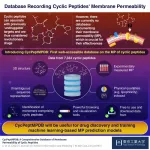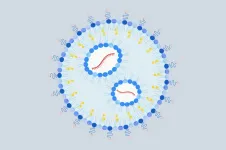(Press-News.org) SARS-CoV-2, the virus that causes COVID-19, attaches to a cellular receptor called angiotensin-converting enzyme 2 (ACE2), and activation of the farnesoid X receptor increases ACE2 expression. New research published in the Journal of Internal Medicine suggests that a drug that inhibits the farnesoid X receptor and is used to treat liver disease may decrease SARS-CoV-2 infections and reduce the severity of COVID-19.
The study ran from March 2020 to February 2022 and included 3,214 patients with liver disease, half of whom were taking the drug, called ursodeoxycholic acid (UDCA). Patients taking UDCA had 46% lower odds of being infected with SARS-CoV-2. Among patients who developed COVID-19, UDCA use was associated with 46% reduced odds of having symptomatic COVID-19, 49% lower odds of having moderate COVID-19, and 52% lower odds of having severe or critical COVID-19.
“Although our findings are hypothesis generating and supplement data in experimental animal and human models, no recommendations on UDCA use in either the prevention or treatment of COVID-19 can be made in the absence of prospective randomized controlled trials,” the authors wrote.
URL upon publication: https://onlinelibrary.wiley.com/doi/10.1111/joim.13630
Additional Information
NOTE: The information contained in this release is protected by copyright. Please include journal attribution in all coverage. For more information or to obtain a PDF of any study, please contact: Sara Henning-Stout, newsroom@wiley.com.
About the Journal
JIM – The Journal of Internal Medicine is an international peer-reviewed scientific journal in continuous publication since 1863. JIM publishes original work in clinical science from bench to bedside covering a broad field of internal medicine and its subspecialties. JIM features original articles, reviews, brief reports and research letters.
About Wiley
Wiley is one of the world’s largest publishers and a global leader in scientific research and career-connected education. Founded in 1807, Wiley enables discovery, powers education, and shapes workforces. Through its industry-leading content, digital platforms, and knowledge networks, the company delivers on its timeless mission to unlock human potential. Visit us at Wiley.com. Follow us on Facebook, Twitter, LinkedIn and Instagram.
END
Can a drug used to treat liver disease help prevent SARS-CoV-2 infections and lessen COVID-19 severity?
2023-04-05
ELSE PRESS RELEASES FROM THIS DATE:
Can some snakes do cartwheels to escape or startle predators?
2023-04-05
In research published in Biotropica, investigators report that the Dwarf Reed Snake (Pseudorabdion longiceps) performs cartwheels when threatened. This is the first time such an active rolling motion has been documented in snakes, with images and a detailed description.
The Dwarf Reed Snake is a nocturnal, small snake that lives in regions of Southeast Asia. Typical defense mechanisms that small snakes use against predators include fleeing, camouflage, coloration, odors, death-feigning, and intimidation. ...
Can phototherapy improve cognitive function in patients with dementia?
2023-04-05
In an analysis of published clinical trials, investigators found that phototherapy—or exposure to sessions of bright light—may be a promising non-pharmacological intervention for lessening symptoms of dementia.
The analysis in Brain and Behavior included 12 randomized clinical trials. Results indicated that phototherapy improved cognitive function in patients with dementia, but it did not affect symptoms of depression or sleep quality.
“Further well-designed studies are needed to explore the most effective clinical implementation ...
Could a novel small molecule slow or reverse the effects of Duchenne muscular dystrophy?
2023-04-05
In a new study published in The FASEB Journal, investigators demonstrated the potential of a molecule that may help overcome some of the devastating symptoms of Duchenne muscular dystrophy (DMD), the most common life-limiting congenital neuromuscular disorder. The agent promotes the activity of AMP-activated protein kinase (AMPK), an important fuel-sensing enzyme that is present in all mammalian cells.
Previous research has shown that stimulating AMPK can mitigate the dystrophy—or wasting—of muscles, but AMPK activators have failed to reach the clinic due to either their lack of potency or toxic off-target effects.
In ...
CycPeptMPDB: A database aimed at promoting drug design using cyclic peptides
2023-04-05
CycPeptMPDB, a novel database—created by Tokyo Tech researchers—focused on the membrane permeability of cyclic peptides, could accelerate the development of drugs based on these promising compounds. This database was created by gathering published information on thousands of cyclic peptides and organizing it neatly in an online-accessible platform. Thanks to its search and visualization capabilities, CycPeptMPDB could pave the way to new computational and machine learning methods for screening and designing drugs with cyclic peptides.
One of the ...
Brain injury toolkit helps support domestic violence survivors
2023-04-05
COLUMBUS, Ohio – A new approach to trauma-informed care developed by domestic violence survivor advocates and researchers at The Ohio State University has been found in a new study to improve support organizations’ care for survivors by better recognizing brain injury and addressing its often long-lasting repercussions.
The study appears in the Journal of Head Trauma and Rehabilitation.
CARE is the first trauma-informed approach that considers brain injury in the complex set of circumstances to be addressed and accommodated in order ...
Aging at AACR Annual Meeting 2023
2023-04-05
Impact Journals (Aging's publisher) is proud to participate at the American Association for Cancer Research (AACR) Annual Meeting 2023, which convenes April 14-19 in Orlando, Florida.
BUFFALO, NY-April 4, 2023 – Impact Journals will be participating as an exhibitor at the American Association for Cancer Research (AACR) Annual Meeting 2023 from April 14-19 at the Orange County Convention Center in Orlando, Florida. This year, the AACR meeting theme is: “Advancing the Frontiers of Cancer Science and Medicine.”
Impact ...
A cold-specialized icefish species underwent major genetic changes as it migrated to temperate waters, new study finds
2023-04-05
Many animals have evolved to tolerate extreme environments, including being able to survive crushing pressures of ocean trenches, unforgiving heat of deserts, and limited oxygen high in the mountains. These animals are often highly specialized to live in these specific environments, limiting them from moving to new locations. Yet, there are rare examples of species that once lived in harsh environments but have since colonized more temperate settings. Angel Rivera-Colón, a former graduate student now postdoc in the lab of Julian Catchen (CIS/GNDP), an associate professor in the department ...
Bacterial signaling across biofilm affected by surface structure
2023-04-05
Similar to how cells within human tissues communicate and function together as a whole, bacteria are also able to communicate with each other through chemical signals, a behavior known as quorum signaling (QS). These chemical signals spread through a biofilm that colonies of bacteria form after they reach a certain density, and are used to help the colonies scavenge food, as well as defend against threats, like antibiotics.
“QS helps them to build infrastructure around them, like a city,” ...
Researchers discover new class of ribosomal peptide with hemolytic activity
2023-04-05
Living organisms produce a myriad of natural products which can be used in modern medicine and therapeutics. Bacteria and other microbes have become the main source for natural products, including a growing family called ribosomally synthesized and post-translationally modified peptides, or RiPPs. The labs of Douglas Mitchell (MMG), John and Margaret Witt Professor of Chemistry, and Huimin Zhao (CABBI/BSD/GSE/MMG), Steven L. Miller Chair of Chemical and Biomolecular Engineering, at the University of Illinois Urbana-Champaign have been working in tandem to identify and analyze new RiPPs that could be good candidates ...
Nanoparticle with mRNA appears to prevent, treat peanut allergies in mice
2023-04-05
Peanut allergies affect 1 in 50 children, and the most severe cases lead to a potentially deadly immune reaction called anaphylactic shock.
Currently, there is only one approved treatment that reduces the severity of the allergic reaction, and it takes months to kick in. A group of UCLA immunologists is aiming to change that.
Taking inspiration from COVID-19 vaccines as well as their own research on the disease, they created a first-of-its-kind nanoparticle — so small it’s measured in billionths of a meter — that delivers mRNA to specific cells in the liver. Those cells, in turn, teach the body’s natural defenses to tolerate ...



